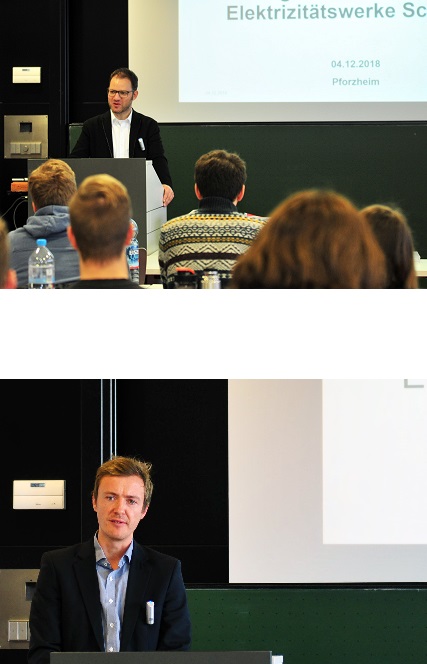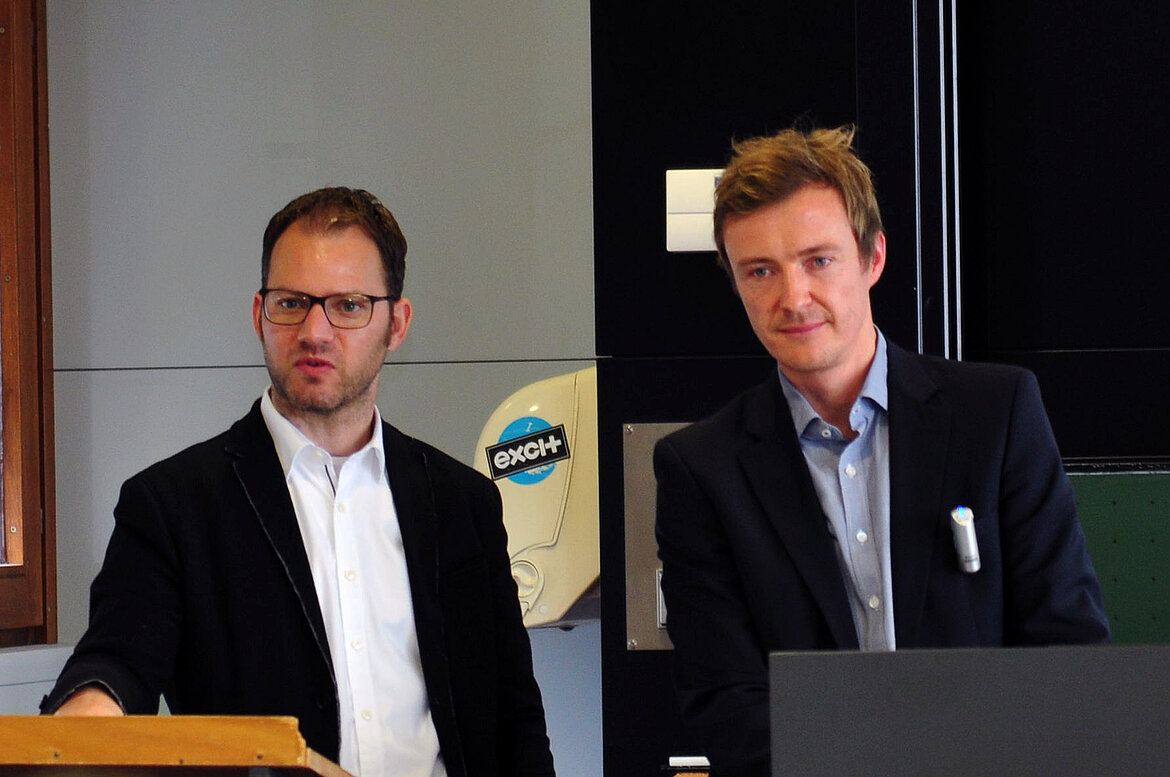The energy supply of tomorrow using the example of Elektrizitätswerke Schönau
The energy supply of tomorrow using the example of Elektrizitätswerke Schönau
On 4.12.18, the lecture series took place as part of an event that was part of the Auditing lecture series. The speakers were Armin Komenda, member of the board of directors of Elektrizitätswerke Schönau (EWS) and Thies Stillahn, who works for EWS in the field of strategic business development. The lecture of the two dealt with the idea behind cooperatives, the history of EWS as well as the way of the future energy supply.
Armin Komenda started the lecture with a short introduction to the topic of cooperatives. For over 150 years there are cooperatives in Germany and approximately 20 million humans in Germany are member in a cooperative, i.e. approx. each fourth citizen. In Baden-Württemberg even every third person is a member of a cooperative. Cooperatives are based on the principle of democracy, so each member has one vote regardless of its share. The goal of cooperatives is the economic promotion of the members with the basic idea "What one does not create, many create". There are different forms of cooperatives: e.g. cooperatives that are supplied by their members, such as winegrowers' cooperatives or cooperatives from which members receive services such as butcher's or baker's cooperatives. Cooperatives are more diverse than one might think, (un)known examples of cooperatives are Intersport, Euronics or taxi associations. A new focus for cooperatives is currently emerging in health care and energy supply. The Deutsche Genossenschafts- und Raiffeisenverband (DGRV) is the umbrella organisation of the German cooperative organisation, pursueing the goal of establishing the cooperative idea abroad, including in the context of electrifying rural regions in Asia and Africa.
After this brief introduction, the topic of energy cooperatives and energy system transformation continued. The necessity of the energy system transformation is undisputed for the speakers. The perceptible climate change and the missed climate protection targets force us to do so. They also emphasised that the press hardly mentions the fact that Germany is facing fines for failing to reach its climate protection targets. In 2017, the share of renewable energies in electricity generation was around 33 %. This part of the lecture ended with the remark that energy cooperatives are not a new development: the two oldest energy cooperatives were founded in Baden-Württemberg in 1910 with the aim of electrifying remote rural regions.
EWS is also an energy cooperative. The EWS have their origin in the citizens' initiative "Parents for a nuclear-free future". It was formed in 1987 in the small town of Schönau with a population of 2,500 against the backdrop of the nuclear catastrophe in Chernobyl in 1986. In a kind of crowdfunding campaign, money was collected to buy the electricity grid from the then operator.
Following this, Thies Stillahn spoke about the change in the energy supply. Three mega-trends should be mentioned here: solarization/decentralization, digitization and electrification (sector coupling of electricity with heat and mobility). Mr. Stillahn summed up EWS's vision for the energy supply of the future as follows: "We want to use the opportunities of digitization to realize a decentralized, citizen-oriented system on the basis of renewables.
The company is therefore currently working together with other partners on a project in the "Model Region Schönau". Several civic energy producers are to join forces to form a regional community. In this way, electricity should be consumed where it has been produced. For this it is necessary to equip the households with a new digital technology, which registers where how much electricity is produced, where it is needed and which controls an appropriate distribution. Should the Community not be able to meet the electricity demand, the EWS will intervene. A surplus of electricity can also be injected into the grid.
The two speakers are calmly opposed to the question of whether such a model would not lose customers, because this model still requires someone to manage trade, calculate taxes, pay levies and make electricity available if the community cannot meet its own needs.
Mr Komenda and Mr Stillahn are certain that the EWS will again be able to become a pioneer in electricity generation and supply during the energy revolution, similar to 1987.


